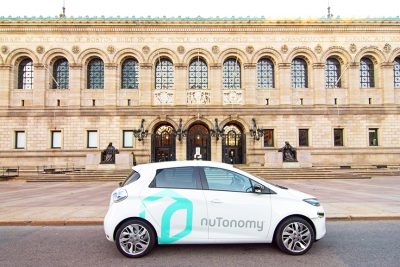
As fleets of robo-taxis prepare their debut, Massachusetts Institute of Technology startup nuTonomy is handling the hub of ethics, safety and potential impact of this massive change to transportation.
Karl Iagnemma, the CEO and co-founder of nuTonomy, noted that his company’s ultimate vision is “to deploy a safe, efficient, fully autonomous mobility-on-demand transportation service in urban centers around the world,” in an email sent to The Daily Free Press.
“[Automated vehicles] will fundamentally change the driving industry as well as public transportation by offering lower costs to operate, increased safety and enhanced efficiency,” Iagnemma wrote.
The development of autonomous on demand vehicles has the potential to shift the Boston landscape, lessening the need for parking spaces and structures, he continued. This same land can be repurposed for parks or other purposes, potentially reducing pollution and preserving the environment.
NuTonomy’s vision of a self-driving fleet could change many other portions of the transportation market, including food delivery services and car insurance. However, the fleet of autonomous vehicles on the horizon is not yet close enough to inspire changes in these fields.
“We expect to see a shift from personally owned vehicle to the use of AVs in a mobility service model,” Iagnemma added in a phone interview.
Food delivery startups such as Grubhub internalize the cost of fuel and payments to delivery employees. A shift to self-driving cars could change the delivery industry, potentially lowering these costs and allowing fleets to deliver food and other packages more efficiently, especially with the remote routing that nuTonomy is developing.
Grubhub Public Relations Associate Lindsey Ruthen said the autonomous vehicle market is not a main focus for the company. This may change as the technology undergoes testing and becomes available in Boston, she added.
The perception of consumers will play a large role in the success of the autonomous vehicle industry. With that in mind, nuTonomy’s testing will lead to potential improved safety, if the vision of autonomous fleets is realized.
“Ride-sharing reduces the number of vehicles traveling on streets resulting in decreased congestion and improved traffic safety … it may be possible to achieve this through the adoption of shared fleets of autonomous vehicles,” Tracey Ganiatsos, public information manager for the Boston Transportation Department, wrote in an email.
Reducing traffic would improve productivity of commuters and the morale of Bostonians city-wide.
While positive impacts are proposed, the adoption of autonomous vehicles also raises interesting ethical questions.
MIT’s Moral Machine analyzes information on how people perceive the decisions made by autonomous vehicle intelligence software. The Moral Machine is an online simulation of driverless vehicle programming that examines the moral decisions made by driverless cars in cases of unavoidable accident.
Sohan Dsouza, a research student in the Scalable Cooperation Group at the MIT Media Lab who is familiar with the Moral Machine, said that the perception of driverless cars depends on where the individual sits in the car.
In the case of a potential accident, Dsouza said, the Moral Machine found “while people prefer that driverless cars prioritize minimizing loss of life, they prefer using driverless cars that prioritize passengers’ lives.”
Customers must believe that these vehicles are safe in order to trust a driverless car to transport them.
“The City of Boston has worked with nuTonomy and MassDOT for many months to ensure that autonomous vehicle testing in done in a safe and responsible manner in Boston,” wrote BTD Commissioner Gina Fiandaca in an email.
Boston was a natural choice given its closeness to MIT, Iagnemma said. However, Boston presents its own difficulties, as Boston drivers are notorious for their aggressive driving and the weather is constantly changing.
Boston’s complexity “might also make it a good training ground for refinement of the technology,” Dsouza said. “In any case, it is a step towards safer and more efficient road transport for all.”
Some young consumers are excited by the idea, and ride-sharing doesn’t seem to be a barrier.
“I only use uberPOOL,” said Sean Smith, a senior in Boston University’s College of Arts and Sciences.
He predicted that “with a ride available at the push of a button for less than the price of public transportation or owning your own car, people will stop driving and taking the T.”




















































































































Kim Sung • Jan 19, 2017 at 9:18 am
GREAT article! Insightful and interesting.